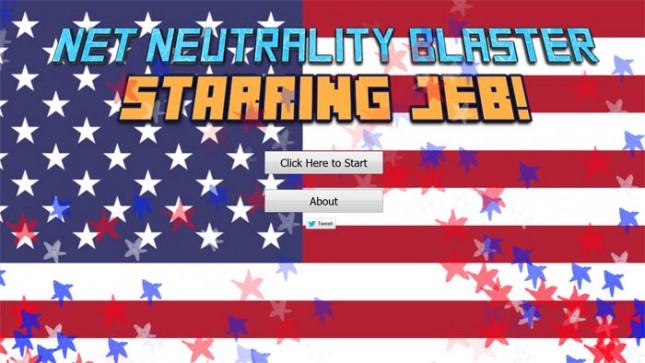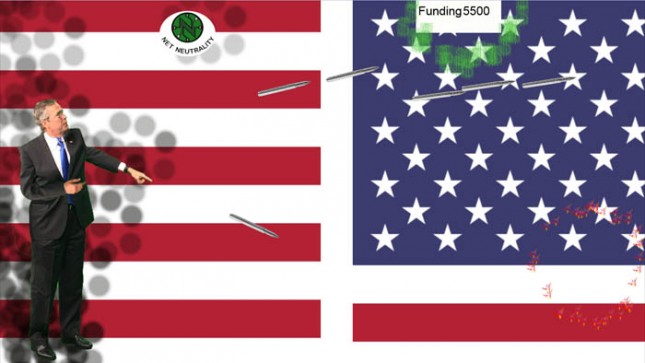Play a Game as Jeb Bush and Destroy Net Neutrality
 The Republican side of the upcoming 2016 US presidential election has been pretty wacky, but this bit of news comes a bit unexpected. There is now a web browser game where you play as Republican candidate Jeb Bush trying to destroy net neutrality! In this game, the player is Jeb Bush trying to shoot down flying objects such as “Streaming Video,” “Freedom of the Press,” “Start Ups,” and “Net Neutrality” to raise funding. You lose when you miss too much and waste funding.
The Republican side of the upcoming 2016 US presidential election has been pretty wacky, but this bit of news comes a bit unexpected. There is now a web browser game where you play as Republican candidate Jeb Bush trying to destroy net neutrality! In this game, the player is Jeb Bush trying to shoot down flying objects such as “Streaming Video,” “Freedom of the Press,” “Start Ups,” and “Net Neutrality” to raise funding. You lose when you miss too much and waste funding.
This past September, Bush announced that he would overturn the FCC’s new net neutrality rules enacted earlier this year. The current regulation prohibits internet service providers from charging for internet fast lanes and throttling service. The domain name at www.provenconservative2016.com is taken from one of Jeb Bush’s campaign town hall meeting in which he questioned Donald Trump’s capabilities for presidency while touting his own, “Mr. Trump doesn’t have a proven conservative record…People will vote for a proven conservative leader.”
This is hardly the first time a web domain has been snatched in front of a political candidate. During the time former HP CEO Carly Fiorina was campaigning for US Senator (R-CA) in 2010, carlyfiorina.org was created to highlight her decision to lay off 30,000 workers at HP. The website is still active and once again relevant now that Fiorina is running for Republican presidential candidate.
Net neutrality has become a controversial issue in modern global politics. Supporters cite that an open internet promotes freedom and equality whereas opponents state that increased control over the web strengthens cybersecurity. More recently this past Tuesday in Europe, the European Union passed regulations protecting net neutrality in all of its 28 member states though with loopholes for now that could allow for fast lanes.
Also on the same day in the United States, the Cybersecurity Information Sharing Act (CISA) passed in the Senate with a 74 – 21 vote. The controversial bill is intended to allow companies to share information about cyber-attacks between each other and the government. However, vague wording and the failure of all amendments to protect privacy have opponents, which have included several major tech companies such as Apple and Twitter, arguing that CISA would increase surveillance and offer reduced accountability for how companies handle private information. CISA was introduced shortly after the massive Sony data breach in November 2014. The bill is the Senate version of the House’s unpopular CISPA bill that passed earlier this year in a 288-127 vote, but was ignored by the Senate and failed to become law.
